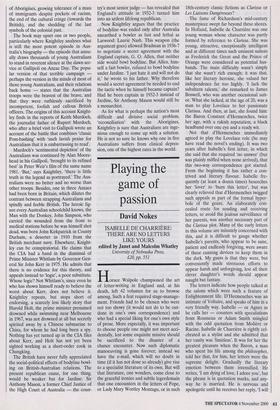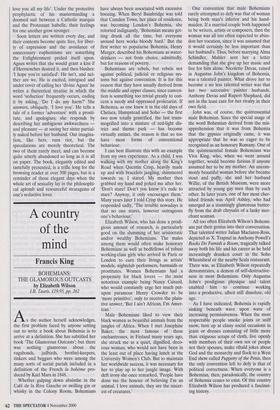Playing the game of passion
David Nokes
ISABELLE DE CHARRIERE: THERE ARE NO LE I MRS LIKE YOURS edited by Janet and Malcolm Whatley University of Nebraska Press, £20, pp. 551 Horace Walpole championed the art of letter-writing in England and, at his death, left 42 volumes for us to browse among. Such a feat required stage-manage- ment. Friends had to be chosen who were not too showy (it would not do to be out- done in one's own correspondence) and who had a special liking for one's own style of prose. More especially, it was important to choose people one might not meet acci- dentally, lest some exquisite missive should be sacrificed to the disaster of a chance encounter. Now such diplomatic manoeuvring is gone forever; instead we have the e-mail, which will no doubt in time (if it has not done so already) give rise to a specialist literature of its own. But will that literature, one wonders, come close to the graceful ironies and subtle legerdemain that one encounters in the letters of Pope, or Lady Mary Wortley Montagu, or in such 18th-century classic fictions as Clarissa or Les Liaisons Dangereuses?
The fame of Richardson's mid-century masterpiece swept far beyond these shores. In Holland, Isabelle de Charriere was one young woman whose character was partly formed by reference to Clarissa. She was young, attractive, exceptionally intelligent and at different times such eminent suitors as Frederick the Great and the Prince of Orange were considered as potential hus- bands. The main difficulty wasn't simply that she wasn't rich enough; it was that, like her literary heroine, she valued her independence far too highly. 'I lack the subaltern talents,' she remarked to James Boswell, who was another occasional suit- or. What she lacked, at the age of 20, was a man to play Lovelace to her passionate Clarissa. And then, at last, she found him: the Baron Constant d'Hermenches, twice her age, with a rakish reputation, a black headband over one eye and a ready wit.
Not that d'Hermenches immediately agreed to play the Lovelace role (he may have read the novel's ending). It was two years after Isabelle's first letter, in which she said that she required `no answer' (but was plainly miffed when none arrived), that this two-way correspondence got started. From the beginning it has rather a con- trived and literary flavour. Isabelle fre- quently (at least a dozen times) beseeches her 'lover' to 'burn this letter', but was clearly relieved that d'Hermenches twigged such appeals as part of the formal hyper- bole of the genre. An elaborately con- cealed route for sending and receiving letters, to avoid the jealous surveillance of her parents, was another necessary part of the Clarissa plot. Many of the early letters in this volume are minutely concerned with this, and it is difficult to gauge whether Isabelle's parents, who appear to be sane, patient and endlessly forgiving, were aware of these cunning devices to keep them in the dark. My guess is that they were, but conveniently made strenuous efforts to appear harsh and unforgiving, lest all their clever daughter's words should appear naught but fantasy.
The letters indicate how people talked at the salons which were such a feature of Enlightenment life. D'Hermenches was an intimate of Voltaire, and speaks of him in a very friendly way. Isabelle — or Agnes as he calls her — counters with speculations from Rousseau or Adam Smith mingled with the odd quotation from Moliere or Racine. Isabelle de Charrière is rightly cel- ebrated as a stylist and she admitted that her vanity was 'limitless'. It was for her the greatest pleasure when the Baron, a man who spent his life among the philosophes, told her that, for him, her letters were the supreme delight. Gradually the literary emotion between them intensified. He writes, 'I am dying of love, I adore you', but the phrase is in quotation marks, and any- way he is married. He is nervous and apologetic until he receives her reply, will love you all my life'. Under the protective prophylactic of his masterminding a doomed suit between a Catholic marquis and the Protestant Isabelle, their feelings for one another grow stronger.
Soon letters are written every day, and their contents become quite free, for liber- ty of expression and the avoidance of unnecessary euphemisms are something the Enlightenment prided itself upon. Agnes writes that she would grant a kiss if d'Hermenches desired it, and then blushes: `I hope you're satisfied'. He isn't, and nei- ther are we. He is excited, intrigued and under cover of calling her 'divine Agnes' he writes a theoretical treatise in which the word 'seduction' frequently occurs, ending it by asking, 'Do I do any harm?' She answers, obliquely, 'I love you'. He tells a tale of a former 'adventure' with a prosti- tute, and apologises; she responds by describing her ambiguous awkwardness and pleasure — at seeing her sister partial- ly naked before her husband. Our imagina- tion, like hers, runs riot, but the speculations are merely theoretical. The two of them rarely meet, and can become quite utterly abandoned so long as it is all on paper. The book, elegantly edited and tastefully presented, is a trifle long for the browsing reader at over 500 pages, but is a reminder of those elegant days when the whole art of sexuality lay in the philosophi- cal aplomb and resourceful stratagems of one's seductive lover.



























































































 Previous page
Previous page